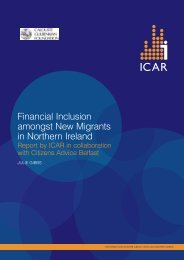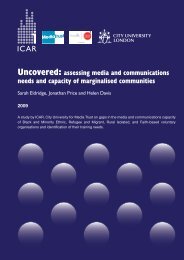Navigation guide Refugee populations in the UK: Algerians - ICAR
Navigation guide Refugee populations in the UK: Algerians - ICAR
Navigation guide Refugee populations in the UK: Algerians - ICAR
You also want an ePaper? Increase the reach of your titles
YUMPU automatically turns print PDFs into web optimized ePapers that Google loves.
Historical context<br />
There is a wide range of onl<strong>in</strong>e 3 historical sources on Algeria and a grow<strong>in</strong>g body of work published <strong>in</strong><br />
English, as well as a large number of publications <strong>in</strong> o<strong>the</strong>r languages, particularly French. This section<br />
provides a brief overview of early events <strong>in</strong> Algeria’s history and <strong>the</strong> background to <strong>the</strong> current conflict.<br />
The turbulent history up to <strong>the</strong> current conflict<br />
The orig<strong>in</strong>al <strong>in</strong>habitants of North Africa were Berber speak<strong>in</strong>g people. There is a great diversity of Berber<br />
languages; <strong>the</strong> site Ethnologue cites 13 separate Berber groups currently resident <strong>in</strong> Algeria, although many<br />
of <strong>the</strong>se are very small. By far <strong>the</strong> most significant are Kabyle, currently spoken by at least 2.5 million people<br />
and Chaouia, spoken by 1.4 million. These groups resident <strong>in</strong> what is now Algeria came under Roman,<br />
Vandal and Byzant<strong>in</strong>e <strong>in</strong>fluence before <strong>the</strong> eighth century conquest of <strong>the</strong> Arabs which profoundly changed<br />
<strong>the</strong> character of <strong>the</strong> area. Under <strong>the</strong> <strong>in</strong>fluence of <strong>the</strong> Arabs, Berbers gradually converted to Islam and <strong>in</strong> <strong>the</strong><br />
areas of Arabic settlement <strong>the</strong>y <strong>in</strong>termarried. Berber communities rema<strong>in</strong>ed relatively dist<strong>in</strong>ct <strong>in</strong> <strong>the</strong><br />
mounta<strong>in</strong>ous areas and <strong>the</strong>se are <strong>the</strong> areas of strong Berber nationalism today. The Spanish made a<br />
number of brief <strong>in</strong>cursions <strong>in</strong> <strong>the</strong> fifteenth and sixteenth centuries but <strong>the</strong>y were repelled by Ottoman forces.<br />
Algeria became part of <strong>the</strong> Ottoman empire <strong>in</strong> <strong>the</strong> sixteenth century.<br />
The area rema<strong>in</strong>ed under Ottoman control until it was <strong>in</strong>vaded by <strong>the</strong> French <strong>in</strong> 1830. For several decades<br />
<strong>the</strong> French rema<strong>in</strong>ed relatively concentrated on <strong>the</strong> coast. From 1830 to 1847, <strong>the</strong> French fought a series of<br />
battles with <strong>the</strong> charismatic figure Abdel-Kader who galvanised Algerian resistance and rema<strong>in</strong>s a significant<br />
national hero. After <strong>the</strong>y had put down <strong>the</strong> f<strong>in</strong>al 1871 rebellion, <strong>the</strong> French government began to promote<br />
European settlement more actively and <strong>the</strong> number of Europeans grew. In 1900, <strong>the</strong>re were 500,000<br />
Europeans liv<strong>in</strong>g <strong>in</strong> Algeria and by <strong>the</strong> end of <strong>the</strong> Second World War this number had grown to more than a<br />
million. 4 These settlers were known as pieds noirs and took control of <strong>the</strong> most fertile land. They <strong>in</strong>cluded<br />
not only French but significant groups of Italian and Spanish settlers. As new generations were born and<br />
raised away from Europe <strong>the</strong>ir own identity evolved, autonomous from Europe and associated very much<br />
with North Africa. The French adm<strong>in</strong>istered Algeria not as a separate colonial territory but as an <strong>in</strong>tegral part<br />
of France. Uniquely among French colonies, it was subdivided <strong>in</strong>to three departments. 5 The bond between<br />
France, Algeria and successive generations of pieds noirs settlers was captured <strong>in</strong> <strong>the</strong> notion of l’Algérie<br />
Française. The strength of this bond must be appreciated if <strong>the</strong> tremendous violence of <strong>the</strong> 1954-62 war,<br />
which resulted <strong>in</strong> Algerian <strong>in</strong>dependence, is to be understood.<br />
The first mobilisation for Algerian <strong>in</strong>dependence occurred not <strong>in</strong> Algeria, where <strong>the</strong> French kept a very tight<br />
control over any political developments, but <strong>in</strong> France. There was a significant Algerian population <strong>in</strong> France<br />
by <strong>the</strong> 1920s and <strong>the</strong>se emigrants were, and have rema<strong>in</strong>ed, extremely politically active. 6 The war of 1954-<br />
62 was extremely traumatic for both sides and comparisons have <strong>in</strong>evitably been made between this and<br />
<strong>the</strong> current conflict. Algeria achieved <strong>in</strong>dependence on 5 July 1962, though it is a significant reflection of <strong>the</strong><br />
symbolic importance of <strong>the</strong> liberation struggle that <strong>the</strong> most significant day <strong>in</strong> <strong>the</strong> Algerian calendar is not 5<br />
3 Amongst <strong>the</strong> most comprehensive is <strong>the</strong> book length study at <strong>the</strong> Library of Congress [accessed 5 May 2004].<br />
4 Stora, B. (1991) Histoire de l’Algérie coloniale (1830-1954). La Découverte, Paris.<br />
5 French colonies were adm<strong>in</strong>istered <strong>in</strong> one of three ways: first as an Overseas Department (Département Outre Mer,<br />
DOM, such as Mart<strong>in</strong>ique today); secondly as an Overseas Territory (Territoire Outre Mer, TOM, such as New<br />
Caledonia today), or thirdly as a Protectorat, (as was <strong>the</strong> case for Morocco and Tunisia). Algeria was <strong>the</strong> only<br />
exception.<br />
6 Stora, B. (1992) Ils venaient d’Algérie: l’immigration algérienne en France 1912-1992. Fayard, Paris.<br />
<strong>Navigation</strong> <strong>guide</strong> to refugee <strong>populations</strong>: <strong>Algerians</strong><br />
©<strong>ICAR</strong> 2004, moral rights Michael Collyer<br />
7

















